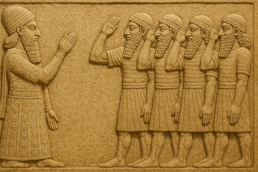Saluting the Final Prophet
Salāt on the Prophet tends to be a hazy concept, and nearly everyone I’ve met has little idea what it means and what it is for. Yet misplaced sensitivities around the Prophet often provokes irrational reactions by the mere question. For those unsure what I mean by "salāt on the Prophet," it's what people commonly understand as saying "peace be upon him" or the Arabic, “Sallalāhu alahi wa sallam”.
Now when it comes to God's final messenger who is most deserving of our allegiance and adoration, many rely on assumptions. As the famous Andalusian jurist and exegete Abū Bakr b. al-Arabī (born in Seville) put it: “People ought to consider their faith as they consider their wealth. In trade, they do not accept defective dinars (gold coins), but only those that are unadulterated and good. Similarly, narrations about the Prophet are not accepted except those with reliable transmissions so that one does not enter into the realm of lying about the Prophet - where a person is after goodness he ends up attaining shortcomings, or perhaps even patent loss!”
Amongst scholars, both medieval and modern, there are various opinions as to what salawāt is, some opinions well reasoned, others poorly so. The plethora of opinions, if anything, demonstrates that it isn't patently clear and requires unpicking. In summary, this post is saying that to salāt on the Prophet is a type of salute which expresses support for the legacy of the Prophet and the cause of God. This desire is manifested through heartfelt acknowledgement, supplicating for it, and practically aiding it. For ease, I’ve worded most of this article in Q&A form to unpick the concept.
A thought on intelligence and the faithful
It’s hard to keep track of time these days but we know we’re getting older. So are the kids. Despite being young our generation will soon be gone and the future will be theirs. But what future are we passing on? What kind of existence are the faithful living today? What have we fallen into? It’s not a matter of ‘catching up’ but being ahead, exuding confidence in what is actually superior (rather than misplaced confidence in the absurd), and with agility staying ahead of the curb. Not playing not to lose, but playing to win. The vanguard (sābiqūn, see Q 56:10) engender this: those at the forefront driven by their faithfulness to God and overachievers in whatever they do, as God expects of them. “They are the closest (to God.)” (Q 56:11)
But this is not what people are commonly taught is from God.
Convert or Revert?
In the English language, the noun convert refers to a person who has changed his/her modern religion. But the word revert has no such theological connotation. It isn't used as a noun, and as a verb simply means to return to a previous state. Applying it to those who truly submit to God as God expects is not only a linguistic aberration, it is also theologically incorrect. For those who attempt to draw on references, it is essentially an unsound understanding of shar’ī sources.
Here are a few brief reasons:




